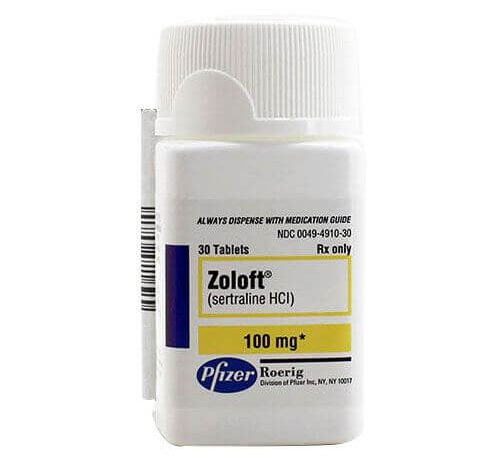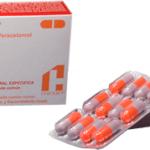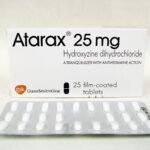Sertraline hydrochloride 100 mg: Uses, Dosage, Side Effects, Review

Why is Sertraline hydrochloride 100 mg prescribed?
Sertraline hydrochloride 100 mg is in a class of antidepressants called selective serotonin reuptake inhibitors (SSRIs). It works by increasing the amounts of serotonin, a natural substance in the brain that helps maintain mental balance. This can improve the symptoms of depression and anxiety.
Sertraline hydrochloride 100 mg is used to treat depression, obsessive-compulsive disorder (bothersome thoughts that won’t go away and the need to perform certain actions over and over), panic attacks (sudden, unexpected attacks of extreme fear and worry about these attacks), posttraumatic stress disorder (disturbing psychological symptoms that develop after a frightening experience), and social anxiety disorder (extreme fear of interacting with others or performing in front of others that interferes with normal life). It is also used to relieve the symptoms of premenstrual dysphoric disorder, including mood swings, irritability, bloating, and breast tenderness.
How should this medicine be used?
Sertraline hydrochloride 100 mg is usually taken once daily in the morning or evening. To treat premenstrual dysphoric disorder, sertraline is taken once a day, either every day of the month or on certain days of the month. Take sertraline at around the same time every day. Follow the directions on your prescription label carefully, and ask your doctor or pharmacist to explain any part you do not understand. Take sertraline exactly as directed. Do not take more or less of it or take it more often than prescribed by your doctor.
Your doctor may start you on a low dose of sertraline and gradually increase your dose, not more than once a week.
It may take a few weeks or longer before you feel the full benefit of Sertraline hydrochloride 100 mg. Continue to take sertraline even if you feel well. Do not stop taking sertraline without talking to your doctor. If you suddenly stop taking sertraline, you may experience withdrawal symptoms such as nausea, sweating, depression, mood changes, frenzied or abnormally excited mood, irritability, anxiety, confusion, dizziness, headache, tiredness, seizures, ringing in the ears, numbness, or tingling in the arms, legs, hands, or feet, difficulty falling asleep or staying asleep.
Other uses for this medicine
Sertraline hydrochloride 100 mg is also used sometimes to treat headaches and sexual problems. Talk to your doctor about the possible risks of using this medication for your condition. This medication may be prescribed for other uses; ask your doctor or pharmacist for more information.
What should I do if I forget a dose?
Take the missed dose as soon as you remember it. However, if it is almost time for the next dose, skip the missed dose and continue your regular dosing schedule. Do not take a double dose to make up for a missed one.
What should I do if I overdose?
In case of overdose, call the poison control helpline at 1-800-222-1222. Information is also available online at https://www.poisonhelp.org/help. If the victim has collapsed, had a seizure, has trouble breathing, or can’t be awakened, immediately call emergency services at 911.
Symptoms of Sertraline hydrochloride 100 mg overdose may include the following:
- drowsiness
- agitation, hallucinations, fever, sweating, confusion, fast heartbeat, shivering, severe muscle stiffness or twitching, loss of coordination, nausea, vomiting, or diarrhea
- excessive tiredness
- dizziness
- agitation
- mania
- seizures
- loss of consciousness
What are the side effects of Sertraline hydrochloride 100 mg?
Sertraline may cause side effects. Tell your doctor if any of these symptoms are severe or do not go away:
- nausea
- diarrhea
- constipation
- vomiting
- difficulty falling asleep or staying asleep
- dry mouth
- heartburn
- loss of appetite
- weight changes
- dizziness
- excessive tiredness
- headache
- nervousness
- uncontrollable shaking of a part of the body
- changes in sex drive or ability
- excessive sweating
Some side effects can be serious. If you experience any of the following symptoms, call your doctor immediately:
- seizures
- abnormal bleeding or bruising
- agitation, hallucinations, fever, sweating, confusion, fast heartbeat, shivering, severe muscle stiffness or twitching, loss of coordination, nausea, vomiting, or diarrhea
- headache, weakness, unsteadiness, confusion, or memory problems
- rash
- hives
- swelling
- difficulty breathing
Sertraline may decrease appetite and cause weight loss in children. Your child’s doctor will watch his or her growth carefully. Talk to your child’s doctor if you have concerns about your child’s growth or weight while he or she is taking this medication. Talk to your child’s doctor about the risks of giving sertraline to your child.
Sertraline may cause other side effects. Call your doctor if you have any unusual problems while taking this medication.
What drugs can interact with Sertraline hydrochloride 100 mg?
Sertraline hydrochloride 100 mg can interact with other medications. It is important for you to keep a written list of all of the prescription and nonprescription (over-the-counter) medicines you are taking, as well as any products such as vitamins, minerals, or other dietary supplements.
An interaction is when a substance changes the way a drug works. This can be harmful or prevent the drug from working well.
To help avoid interactions, your doctor should manage all of your medications carefully. Be sure to tell your doctor about all medications, vitamins, or herbs you’re taking. To find out how this drug might interact with something else you’re taking, talk to your doctor or pharmacist.
You should not take the following under-listed drugs with sertraline. When they are used with sertraline, they can cause dangerous effects on your body. These drugs include:
- Pimozide. Taking this drug with sertraline can cause serious heart problems.
- Monoamine oxidase inhibitors (MAOIs) such as isocarboxazid, phenelzine, and tranylcypromine. Taking these drugs with sertraline increases your risk for serotonin syndrome. You must also wait 14 days between taking these drugs and taking sertraline.
- Linezolid, intravenous methylene blue. Taking this drugs with sertraline increases your risk for serotonin syndrome.
Taking certain medications with Sertraline hydrochloride 100 mg may result in increased side effects. These drugs include:
- Nonsteroidal anti-inflammatory drugs (NSAIDs) such as ibuprofen, naproxen, aspirin and warfarin. Taking these drugs with sertraline increases your risk for bleeding or bruising.
- Triptans such as sumatriptan. Your risk for serotonin syndrome is increased when you take these drugs with sertraline. Your doctor should watch you closely if you take these drugs together.
- Lithium. Taking this drug with lithium increases your risk for serotonin syndrome.
- Serotonergic medications such as fentanyl, tramadol, and St John’s wort. Taking these drugs with sertraline increases your risk for serotonin syndrome.
- Cimetidine. Taking cimetidine with sertraline may cause a build-up of sertraline in your body. Your dose of sertraline might need to be lowered if you take it with cimetidine.
- Tricyclic antidepressants such as amitriptyline, desipramine, and imipramine. Taking sertraline with these drugs may cause these drugs to build up in your body. Your doctor may need to adjust your dosage of tricyclic antidepressants while you take sertraline.
You should bring the list of all your medications with you each time you visit a doctor or if you are admitted to a hospital. It is also important information to carry with you in case of emergencies.





